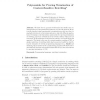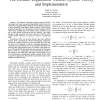203 search results - page 17 / 41 » Real Arguments Are Approximate Arguments |
FOSSACS
2004
Springer
14 years 28 days ago
2004
Springer
Abstract. We show how to generate well-founded and stable term orderings based on polynomial interpretations over the real numbers. Monotonicity (another usual requirement in termi...
AIR
2005
13 years 7 months ago
2005
The paradox of fuzzy modeling is recognized due to the co-existence of its effectiveness of solving uncertain problems in the real world and the skepticism of its reasonability in ...
AIED
2009
Springer
14 years 2 months ago
2009
Springer
In this paper, we discuss how Artificial Intelligence (AI) techniques might be brought to bear in automatically recognizing “creative reasoning” in student e-discussions. An AI...
ICSEA
2007
IEEE
14 years 1 months ago
2007
IEEE
Highly successful scientific disciplines have at least one common denominator; they have developed unified theories that span a large set of phenomena within the discipline. The d...
ARITH
2005
IEEE
14 years 1 months ago
2005
IEEE
— The Residue Logarithmic Number System (RLNS) represents real values as quantized logarithms which, in turn, are represented using the Residue Number System (RNS). Compared to t...


